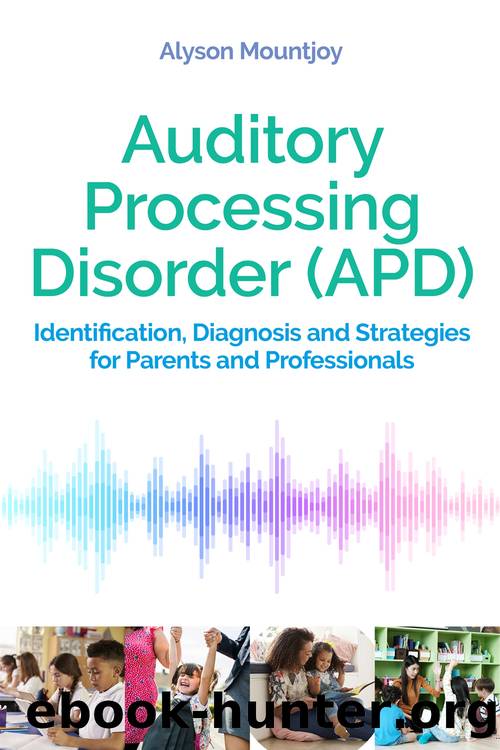Auditory Processing Disorder (APD) by Alyson Mountjoy

Author:Alyson Mountjoy
Language: eng
Format: epub
Publisher: Jessica Kingsley Publishers
Published: 2021-03-18T00:00:00+00:00
Sensory overload and regular breaks
No matter what their type of difficulties, their severity and any coexisting conditions, making sense of what they hear and maintaining coping strategies can be exhausting. Fatigue then adversely affects processing and their natural coping strategies are less effective. Learners with APD therefore need breaks during lessons to avoid sensory overload. Some teachers view this as unnecessary, but a learner in sensory overload will not be able to learn. Their brain will be like a saturated sponge and no more information can be absorbed; it is like their brain is a PC in âsleepâ mode. They cannot control it and may even be unaware that their brain has effectively switched off.
Speech can sound like gibberish and they might not process or understand any more information that day, or retain what they might have managed to process and retain. The breaks are to avoid this happening. Many children with APD suffer from headaches due to noise or stress and/or processing, which can also include stress migraines. If they say they have a headache, this is not an excuse to get out of doing something. If a child has recurring headaches, I would recommend suggesting to parents that they seek referral for their child to a paediatrician, to find the cause.
They will be better able to process at different times of the day when they are less tired, or in subjects or situations where they feel less stressed or anxious. Processing is always poor at these times, and can easily lead to sensory overload because the brain is busy dealing with the effects of these situations and coping strategies suffer as a result, even if they are automatic. Reducing anxiety wherever possible can help.
When in sensory overload, a learner can âzone outâ in class and take nothing in. It is as if their brain switches off but they will usually become aware again if their name is called or their arm is touched gently. They cannot help it and may be unaware when it is happening.
If a learner cannot be roused in this way, they might be having an absence seizure (also known as a petit mal seizure), which is not related to APD, but is one of any other comorbid conditions that might possibly coexist. They may appear motionless, stop talking suddenly or flutter their eyelids. They are usually unaware that this seizure is happening or has happened. This is different to a convulsion; no convulsing will occur. They should be left where they are to come around on their own, but a responsible adult should monitor them and record any movements in order to inform their parents (in case they are unaware that their child has this condition). The parents should be requested to take the child to the GP/family doctor for further investigation. Urination can sometimes occur involuntarily, and this should be dealt with discreetly when the seizure is over. A child with absence seizures can also suffer from sensory overload and might âzone outâ for that reason too.
Download
This site does not store any files on its server. We only index and link to content provided by other sites. Please contact the content providers to delete copyright contents if any and email us, we'll remove relevant links or contents immediately.
| Behavioral Disorders | Communicative Disorders |
| Gifted Students | Inclusive Education |
| Learning Disabled | Mentally Disabled |
| Physically Disabled |
The Art of Coaching Workbook by Elena Aguilar(51199)
Trainspotting by Irvine Welsh(21667)
Twilight of the Idols With the Antichrist and Ecce Homo by Friedrich Nietzsche(18634)
Fangirl by Rainbow Rowell(9251)
Periodization Training for Sports by Tudor Bompa(8273)
Change Your Questions, Change Your Life by Marilee Adams(7783)
This Is How You Lose Her by Junot Diaz(6887)
Asking the Right Questions: A Guide to Critical Thinking by M. Neil Browne & Stuart M. Keeley(5775)
Grit by Angela Duckworth(5615)
Red Sparrow by Jason Matthews(5475)
Paper Towns by Green John(5191)
Room 212 by Kate Stewart(5123)
Ken Follett - World without end by Ken Follett(4734)
Housekeeping by Marilynne Robinson(4449)
The Sports Rules Book by Human Kinetics(4388)
Papillon (English) by Henri Charrière(4274)
Double Down (Diary of a Wimpy Kid Book 11) by Jeff Kinney(4272)
The Motorcycle Diaries by Ernesto Che Guevara(4102)
Exercise Technique Manual for Resistance Training by National Strength & Conditioning Association(4071)
